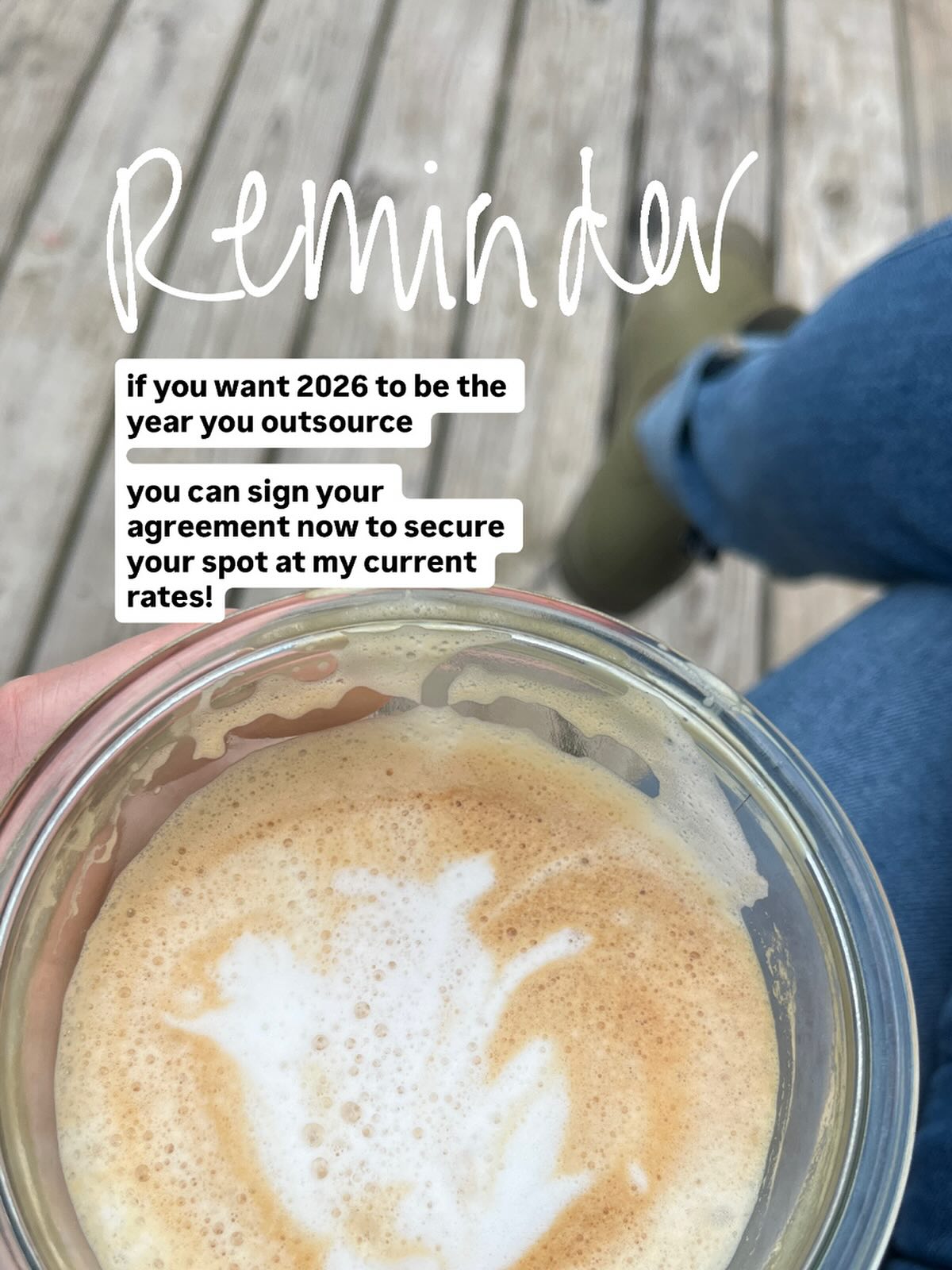How to Know When It’s Time to Hire a Bookkeeper
If you're reading this, you're probably wondering whether you actually need to hire a bookkeeper or if you can keep DIY-ing it for a while longer.
There's no magic revenue number or specific moment where you "officially" need a bookkeeper. Some people hire one in their first year. Others wait until they're making six figures. Some never hire one at all and just suffer through it forever.
(Don't be that person.)
But there ARE some pretty clear signs that it's time to stop doing your own bookkeeping and hand it off to someone who actually knows what they're doing.
Sign #1: You're Avoiding It
If bookkeeping has been sitting on your to-do list for weeks (or months) and you keep pushing it off because you'd rather do literally anything else, that's a sign.
And the longer you avoid it, the worse it gets. One month of catch-up is annoying. Six months of catch-up is a nightmare.
If you're consistently putting off your bookkeeping, it's time to hire someone who won't.
Sign #2: You Have No Idea If You're Actually Profitable
You look at your bank account and think, "Okay, there's money in there, so I must be doing fine."
But do you actually know if you're profitable? Like, after all your expenses, taxes, cost of goods sold, and everything else—are you making money, or are you just busy?
If you can't confidently answer that question, you need a bookkeeper.
Because "money in the bank account" doesn't mean profit. It might mean you haven't paid your quarterly taxes yet. Or you're sitting on inventory that hasn't sold. Or you invoiced a bunch of clients but half of them haven't paid yet.
A bookkeeper will give you actual financial reports so you know what's really happening in your business.
Sign #3: You're Making Business Decisions Based on Guesses
"Can I afford to hire help?"
"Should I invest in this software?"
"Is it time to raise my prices?"
If you're answering these questions with "I think so?" or "Probably?" instead of looking at actual data, you need a bookkeeper.
You can't make smart business decisions without accurate financial information. And if your books are a mess (or nonexistent), you don't have that information.
A bookkeeper keeps your numbers up to date so you can make decisions based on reality, not vibes.
Sign #4: Tax Time Is a Panic-Inducing Nightmare
If tax season makes you want to hide under your desk, that's a problem.
And if you're scrambling every April to find receipts, categorize a year's worth of transactions, and figure out what you actually made, that's an even bigger problem.
Tax time shouldn't be traumatic. It should be boring and straightforward because your bookkeeper has been keeping your records clean all year.
When you have a bookkeeper, tax prep is as simple as sending your accountant a couple of reports and letting them do their thing. No panic. No all-nighters. No wondering if you're going to owe way more than you thought.
Sign #5: You're Not Sure If You're Doing It Right
Maybe you've been keeping up with your bookkeeping, but you have this nagging feeling that you're doing it wrong.
You're not sure if you're categorizing things correctly. You don't know if you're supposed to be tracking something you're not tracking. You reconciled your accounts, but the numbers don't quite make sense.
If you're spending more time worrying about whether you're doing it right than actually doing it, just hire someone who knows.
Bookkeeping isn't intuitive. There are rules, best practices, and a whole lot of nuance. You shouldn't have to become an expert in it just to run your business.
Sign #6: Your Business Is Growing (And You're Drowning)
This is a good problem to have, but it's still a problem.
Your business is doing well. You're getting more clients, more sales, more revenue. That's awesome!
But now you're also dealing with way more transactions, invoices, expenses, and financial complexity. And you're realizing that bookkeeping is taking up more and more of your time.
Growth is great, but it shouldn't come at the cost of your sanity. When your business outgrows your ability to manage the books yourself, it's time to bring in help.
Sign #7: You're Spending Billable Hours on Bookkeeping
If you're a service provider who bills by the hour, every hour you spend on bookkeeping is an hour you're not getting paid for.
Let's say you bill $100/hour and you spend 5 hours a month on bookkeeping. That's $500 of lost income every month. $6,000 a year.
If you hired a bookkeeper for $400-500/month, you'd actually come out ahead because you could spend those 5 hours on paying client work instead.
The math is pretty simple: if your time is worth more than what a bookkeeper costs, hire the bookkeeper.
Sign #8: You've Made Expensive Mistakes
Maybe you missed a tax deadline and got hit with penalties.
Maybe you didn't realize you were losing money on a product until six months in.
Maybe you forgot to invoice a client and lost out on revenue.
These mistakes happen when you're trying to do everything yourself and bookkeeping falls through the cracks.
If you've already made a costly mistake (or a few), it's time to hire someone before it happens again.
Sign #9: You Want to Actually Understand Your Numbers
Some people hire a bookkeeper because they hate bookkeeping.
But some people hire a bookkeeper because they want to actually understand their business finances, and they need someone to translate the numbers into something that makes sense.
A good bookkeeper doesn't just keep your books clean. They also help you understand what your financial reports are telling you, what's going well, and what needs attention.
If you want to be financially informed about your business (without having to become a bookkeeping expert), hire someone who can explain it to you.
Sign #10: You Just Don't Want to Do It Anymore
Honestly? This one's enough on its own.
You don't have to hate bookkeeping to outsource it. You don't have to be behind or drowning or making mistakes.
You can just... not want to do it.
If bookkeeping isn't the best use of your time, energy, or brain space, hire someone to do it for you. You're allowed to focus on the parts of your business you actually enjoy.
But What If I'm Not Making Enough Money Yet?
This is the most common objection I hear: "I can't afford a bookkeeper yet."
And look, I get it. If you're just starting out and barely breaking even, spending $400-500/month on bookkeeping might not make sense.
But here's what I'll say: if you're making any revenue at all, you need some kind of bookkeeping system. Even if that's just you spending an hour a month keeping QuickBooks up to date.
Because the longer you go without tracking your finances, the harder it gets to clean up later. And the messier your books are, the more it's going to cost to fix them.
So if you truly can't afford to hire help yet, at least commit to doing it yourself consistently. Set aside time every week (or at minimum, every month) to keep your books current.
And as soon as you can afford it, hire someone. It's one of the best investments you can make in your business.
The Bottom Line
You don't need to wait until you hit some arbitrary revenue milestone to hire a bookkeeper.
You should hire one when:
- Bookkeeping is taking up time you could spend on revenue-generating activities
- You're avoiding it and falling behind
- You're making business decisions without accurate financial data
- Tax time is stressful because your records are a mess
- You're not sure if you're doing it right
- You just don't want to do it anymore
If any of those apply to you, it's time.





Hey there!
I'm Taylor—the face behind Coyne Bookkeeping. I believe your business should support your life, not take it over.
Whether you're behind, burned out on DIY, or just want someone steady providing support that actually feels helpful—you're in the right place.
Ready to stop DIY-ing your bookkeeping?
If you've been staring at QuickBooks wondering what the heck you're doing, you're not alone.
That's literally what I'm here for.








